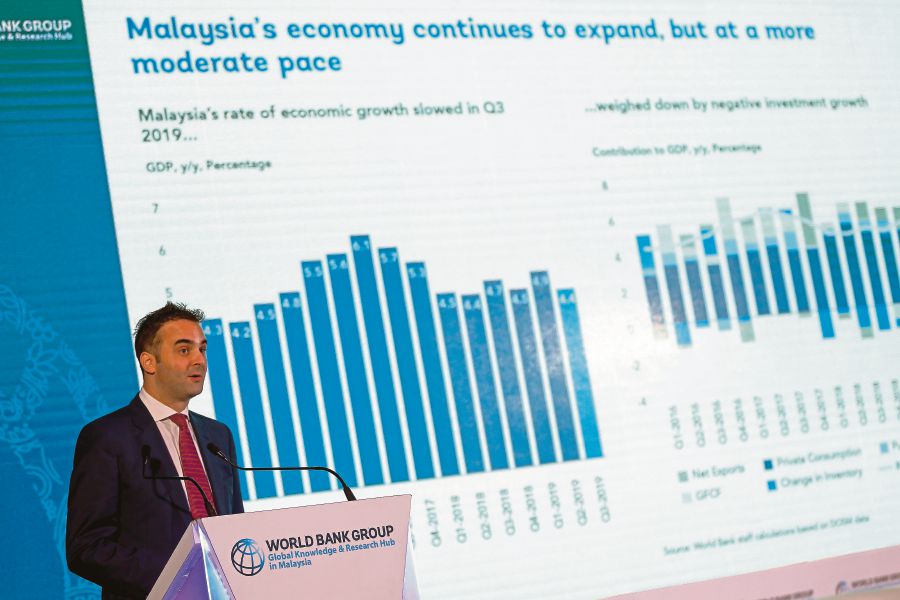Malaysia’s household debt-to-GDP ratio surges to new peak of 93.3%
Malaysia’s household debt-to-Gross Domestic Product (GDP) ratio surged to a new peak of 93.3% as at December 2020 from its previous record high of 87.5% in June 2020, according to Bank Negara Malaysia (BNM). BNM said this is mainly because growth in the nation’s household debt had normalised to pre-pandemic levels in the second half of 2020 (2H20), but the GDP remained below pre-Covid-19 levels. “A concern over high household debt is that it may lead to a rapid deleveraging by households in the aftermath of a crisis, thus dampening or derailing economic recovery,” BNM warned. According to BNM, household debt growth in 2H20 was mainly driven by car and housing loans, which expanded 6.1% and 7.4% from a year earlier respectively, lifted by strong response to sales and service tax exemption for the purchase of cars and various homeownership incentives. Personal financing registered a higher annual growth of 7.1%, partly due to the suspension of repayments during the automatic loan moratorium period. In the short term, economists believe this high level of household debt-to-GDP ratio is manageable and do not pose that significant a risk to the country’s financial stability. (The Edge)
Unsold commercial properties worrisome, says Bank Negara governor
The number of unsold properties has seen a respite amid the government’s Home Ownership Campaign (HOC) except for the commercial market, which remains worrisome amid the new norms, Bank Negara Malaysia (BNM) Governor Datuk Nor Shamsiah Mohd Yunus said. in terms of unsold properties, BNM is much more worried of the unsold commercial space because the excess capacity in the market would be made much worse under the new normal. “With the pandemic and greater online sales, more work from home arrangements, the need for office space and physical premises will come down and the demand will not be as high as before,” she said. “Luckily, the bank’s exposure to this segment is very small. It accounts to 3.2% of the total loans.” Nevertheless, the central bank said in its Financial Stability Review Second Half of 2020 that the softer housing market conditions prompted developers to adjust supply towards more affordable housing segments. It added that the low interest rate environment also encouraged purchases for both own occupancy and investment purposes. (Malay Mail)
LBS Bina unit signs JV for RM1.5bil GDV Cameron Highlands development
LBS Bina Group Bhd’s sub-subsidiary Casa Inspirasi Sdn Bhd has entered a joint venture with the Cameron Highlands district council for a RM1.5bil GDV development on a tract of Tanah Rata leasehold land. LBS Bina said the development will be mixed-use, comprising residential and commercial properties including service apartment, retail shops, and landed residential units. It will be located along the main road Route 59 from Kea Farm to Time Tunnel Museum in Brinchang. The project period will be 10 to 15 years. The Cameron Highlands district council, as the landowner, will be entitled to RM120mil as the consideration of the joint venture. The consideration will be satisfied with RM11mil cash and the remaining RM109mil via development costs for public-usage buildings such as a bazaar, botanic gardens and stadium on part of the land measuring about 17.2 acres. (The Star)
Home Ownership Campaign 2020/2021 sales hit RM25.65bil as at end-Feb
Total sales for the ongoing Home Ownership Campaign (HOC) hit RM25.65 billion as at Feb 28, 2021, on a back of 34,354 residential units having been sold, according to the Real Estate & Housing Developers’ Association (Rehda). Its president Datuk Soam Heng Choon said the bulk of sales, or 37%, comprised properties ranging between RM500,000 and RM750,000. This was followed by properties priced between RM300,000 and RM500,000 (26%), and between RM750,000 and RM1 million (19%). For property types, the top three selling properties were service apartments, double-storey terrace houses and condominium apartments. Soam anticipates property sales to pick up in the upcoming months before the HOC comes to an end. The Malaysia Property Expo (MAPEX), which will be held in May, is expected to encourage potential homebuyers to take advantage of the last opportunity of HOC. An extension of HOC until end-December this year tops the wishlist for industry players to accelerate property market recovery, said Soam. (The Edge)
BNM has no immediate plans to issue central bank digital currency
Bank Negara Malaysia (BNM) does not have any immediate plans to issue Central Bank Digital Currency (CBDC). The central bank said in Malaysia the financial system continues to support the functioning of the economy while meeting the needs of individuals and businesses. “The existing monetary and financial policy tools have remained effective in safeguarding monetary and financial stability. Moreover, domestic payment systems, including the real-time retail payments platform (RPP) also continues to operate safely and efficiently to support the needs of the economy and allow real-time digital payments,” said BNM in its Annual Report 2020. Technological advancements and increasing pace of digitalisation have led to the rising adoption of digital payments and the emergence of privately-issued digital assets, among them Bitcoin, Ethereum and Stablecoin. Most digital assets, in their current form, are not used as payment instruments primarily because they do not exhibit the universal characteristics of money as they are prone to price volatility, vulnerable to cyber threats and lack scalability, it said. (Malay Mail)





